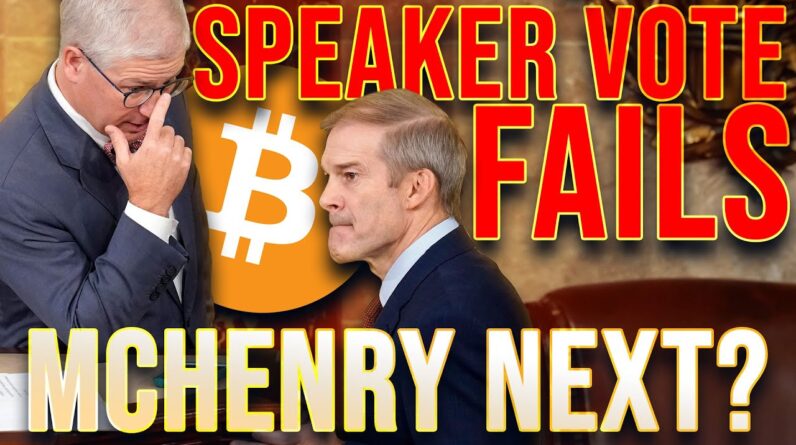
As passionate advocates for cryptocurrency, we were intrigued by recent events in the world of politics that showcased the clash between two influential figures. In a surprising turn of events, Jim Jordan, a well-known name in the political sphere, fell short when matched against the pro-crypto Patrick McHenry for the esteemed position of Speaker. The implications of this showdown are significant and warrant a deeper analysis. Join us as we dissect the failures of Jim Jordan and delve into the implications for the crypto community.
Introduction
In the realm of American politics, discussions surrounding the selection of a House speaker can often become heated and divided. Currently, the spotlight is on the Republicans and Democrats as they consider electing a new House speaker. One name that has been gaining attention is Representative Patrick McHenry. However, there are factions within the Republican Party who are unsure about his suitability for the position, particularly due to his stance on cryptocurrency. This article will explore the dynamics surrounding McHenry’s potential nomination, as well as the implications it may have on legislative functions and funding.
Heading 1: The Controversial Candidacy of Rep. Jim Jordan
Subheading 1: Doubts Surrounding Jim Jordan’s Candidacy for House Speaker
One of the key figures in the race for House speaker is Rep. Jim Jordan. While he is a popular choice among some Republicans, doubts have been raised about his ability to secure the necessary support. The Republican Party is divided on various issues, and some question whether Jordan has the necessary skills to unify the party and lead effectively.
Heading 2: Factions Within the Republican Party
Subheading 2: The Divide Over the Speaker Position
The Republican Party is no stranger to internal divisions, and the selection of a House speaker is no exception. There are factions within the party that hold differing views on who should assume the position. Some factions believe that the party needs someone with a fresh perspective and are thus hesitant to support McHenry. Others, on the other hand, argue that McHenry’s experience and track record make him the ideal candidate. This divide within the party further complicates the process of selecting a new speaker.
Subheading 3: Pro-Crypto Republicans’ Stance on McHenry
Within the Republican Party, there is a group of pro-crypto Republicans who have expressed concerns about McHenry’s suitability for the speaker position. Figures like Warren Davidson, known for their advocacy of cryptocurrencies, feel that McHenry’s past positions on crypto regulation are not aligned with their goals. This adds another layer of complexity to the speaker selection process and highlights the divergent views within the party.
Heading 3: Alternative Perspectives
Subheading 4: Tim Scott’s Proposal for McHenry
Amidst the debates surrounding McHenry’s candidacy, Senator Tim Scott has put forth an interesting proposal. Scott suggests making McHenry the speaker pro tempore, a position that serves as a stepping stone to the House speaker role. This proposal could potentially provide a compromise solution that satisfies both those who support and oppose McHenry’s nomination.
Subheading 5: Chris Christie’s Call for a New Speaker
Former New Jersey Governor Chris Christie has weighed in on the debate, arguing that a new speaker should be chosen through either the speaker pro tempore status or a next-in-line approach. Christie believes that this approach would ensure a smooth transition and foster unity within the Republican Party.
Heading 4: The Importance of Swift Action
Subheading 6: The Urgency to Choose a Speaker
The selection of a new House speaker is not an insignificant decision. It is crucial for the Republicans and Democrats to have a speaker in place by the end of the week to maintain continuity and ensure the smooth functioning of legislative processes. Delaying the decision could have far-reaching implications for various aspects of governance.
Subheading 7: Implications for Legislative Functions and Funding
The person who assumes the role of speaker wields significant influence over legislative functions and funding. Their priorities and agenda can shape the trajectory of important issues, including crypto regulation and legislation. It is essential for the party to choose a speaker who aligns with their shared objectives and can effectively navigate the political landscape.
Conclusion
The ongoing debate surrounding the nomination of Rep. Patrick McHenry as House speaker highlights the complexities and divisions within the Republican Party. While some view McHenry as a strong candidate, others, particularly pro-crypto Republicans, have reservations. As the clock ticks, the party must make a decision that prioritizes unity and effective leadership, taking into account the implications for legislative functions and funding.
Unique FAQs:
-
Q: What role does the House speaker play in the legislative process?
A: The House speaker holds a key leadership position and influences legislative functions, agenda setting, and funding allocation. -
Q: Why are pro-crypto Republicans hesitant to support McHenry?
A: Pro-crypto Republicans have concerns about McHenry’s stance on cryptocurrency regulation, believing it may hinder their objectives. -
Q: Can a compromise solution be found to address the divisions within the Republican Party?
A: Senator Tim Scott’s proposal to make McHenry the speaker pro tempore presents a potential compromise solution. -
Q: What impact could delaying the selection of a new House speaker have?
A: Delaying the decision could lead to disruptions in legislative processes and complicate governance. -
Q: How might the choice of speaker affect crypto regulation and legislation?
A: The speaker’s stance on crypto regulation can impact the trajectory and outcome of related legislation.


![THESE BITCOIN WHALES JUST FOOLED EVERYONE! [Exact strategy....]](https://www.cryptocurrents.net/wp-content/uploads/2024/08/these-bitcoin-whales-just-fooled-everyone-exact-strategy-WhgubJxMmeA-796x445.jpg)

![WARNING: EVERY BITCOIN BEAR WILL BE LEFT CRYING [Huge chart.....]](https://www.cryptocurrents.net/wp-content/uploads/2024/08/warning-every-bitcoin-bear-will-be-left-crying-huge-chart-jgadWvvgEJw-796x445.jpg)

